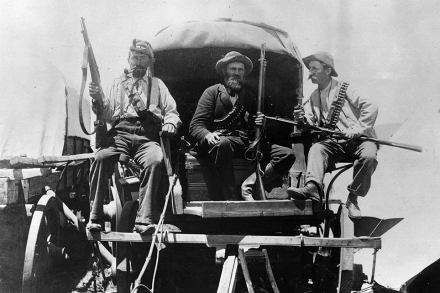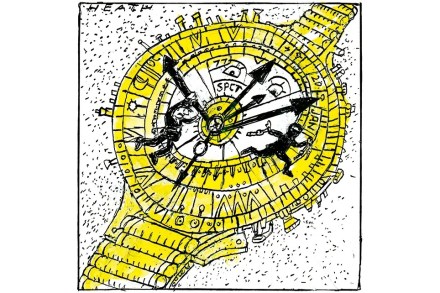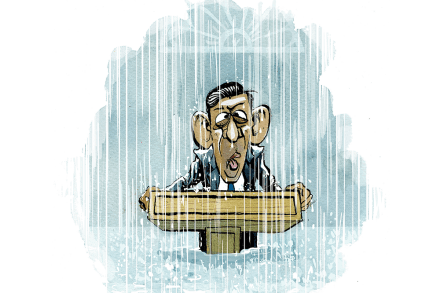Afrikaners have been endlessly maligned
They have been made a scapegoat for the politics and practice of white supremacy. They do not deserve this

Matthew Parris is a columnist for The Spectator and The Times.
They have been made a scapegoat for the politics and practice of white supremacy. They do not deserve this

This I began writing two weeks ago as an overnight guest in a cosy cabin on a farm beside an endless dirt road in the most remote part of the north-western Cape Province in the country of my birth, South Africa. To many eyes this might seem a landscape of utter desolation: hot, dry and

Last week at the Buxton International Festival I joined a big audience for an onstage interview with Anna Reid. She’s a writer who specialises in Eastern European history, was once the Economist magazine’s correspondent in Ukraine, and made her name with a brilliant book, Borderland, which was both a portrait, a history and an appreciation

30 min listen
On this week’s Spectator Out Loud: after President Biden’s debate disaster, Freddy Gray profiles the one woman who could persuade him to step down, his wife Jill (1:05); Angus Colwell reports from Israel, where escalation of war seems a very real possibility (9:02); Matthew Parris attempts to reappraise the past 14 years of Conservative government (14:16);

Memorably sweeping statements tripping easily from the tongue have a habit of worming their way into assumptions we make and ending up as the judgment of history. The word ‘appeasement’ rather than the decisions Neville Chamberlain actually took have consigned the name of a defensible statesman to something approaching a term of abuse. ‘Milk snatcher’

The opposite of attraction is repulsion. Political commentary gives too little attention to a party’s (or leader’s) capacity to repel. Attractiveness to some may itself inspire disgust in others, simultaneously lifting support yet imposing a ceiling upon how high. Here’s a quiz. Our last five elections have seen Labour and the Conservatives slugging it out

28 min listen
On this week’s Spectator Out Loud: Max Jeffery reports on the rise of luxury watch thefts in London (1:18); Melanie McDonagh discusses the collapse of religion in Scotland (5:51); reflecting on the longevity of Diane Abbott and what her selection row means for Labour, Matthew Parris argues that shrewd plans need faultless execution (10:44); Iain MacGregor

‘Tony Blair walks on water.’ Decades ago this statement led a Times photographer and me to the front door of the dismal Hackney North & Stoke Newington Labour party offices. It was 23 April 1997, and a fateful general election loomed. I was my newspaper’s 46-year-old political sketchwriter, and Labour’s local candidate was a 43-year-old

53 min listen
It’s a bumper edition of The Edition this week. After Rishi Sunak called a surprise – and perhaps misguided – snap election just a couple of hours after our press deadline, we had to frantically come up with a new digital cover. To take us through a breathless day in Westminster and the fallout of


Last week saw a flurry of media reports, of whose headlines one of the worst preceded one of the best reports. ‘Eating too many ultra-processed foods has been linked to a higher risk of early death,’ barked the Telegraph – but went on to explain carefully and fairly a ground-breaking report. Other broadsheets opted for
Can nothing protect us from a plague of plastic tree protectors? They’ve descended on us like locusts, covering our hills, dales and roadsides with a nasty green and black petrochemical swarm. They are not for the most part biodegradable, and those that claim to be will still disintegrate into microplastic debris lodged into our soil.

It’s been a torrid few weeks for anyone who knows anyone who was running in the London Marathon. In have come the emails sent by the sender to himself or herself, and BCC’d no doubt to a very long list of the sender’s friends: ‘I’m running the London Marathon on 21 April, for [insert name

32 min listen
This week: Matthew Parris questions what’s left to say about the Tories (00:57), Laurie Graham discusses her struggle to see a GP (07:35), Rachel Johnson makes the case against women only clubs (13:38), Laura Gascoigne tells us the truth about Caravaggio’s last painting (19:21) and Angus Colwell reads his notes on wild garlic (28:58). Produced by

Spare a thought for us political commentators. We stare into the void between now and a (presumed) decisive Labour victory in a (presumed) autumn general election, haunted by the need to say something significant on a weekly basis at least. Yet there seems so little left to say. Readers don’t need to be told that

Throughout the short life of the Assisted Dying Bill which failed in the Commons, the ‘faith community’ (a quaint term for that category of human beings who throughout history have been more assiduous than any other in trying to kill each other) have with skill and persistence deployed an argument of great potency. Such is

Many years ago, for my Great Lives BBC radio programme, we recorded Jeremy Paxman’s championing of the life of Anthony Ashley Cooper, 7th Earl of Shaftesbury. It was an excellent choice and Mr Paxman persuasively laid out that great campaigner’s achievements in the reform of child-labour legislation and the lunacy laws. ‘As we look back

For my newspaper I wrote last week about the rocketing numbers (now more than nine million) of our fellow citizens who are ‘economically inactive’ (aged 16-64, unemployed but not seeking work). Within that category, a fast-growing number (nearly three million) are claiming a range of disability or sickness-related benefits, usually a PIP (personal independence payment).

Columnists get unsolicited free copies of new books, it often seems by almost every post. They frequently come as publishers’ ‘uncorrected proofs’, before publication day. Publicists are of course hoping we might mention the book in something we write, and often there’s a friendly note inviting us to provide a quote for the book-cover’s inside

32 min listen
On this week’s episode, Lionel Shriver asks if Donald Trump can get a fair trial in America (00:39), Angus Colwell speaks to the Gen-Zers who would fight for Britain (08:25), Matthew Parris makes the case for assisted dying (13:15), Toby Young tells the story of the time he almost died on his gap year (20:43),

‘If I’d known where it would take me I might never have started.’ This need not be an expression of regret. There are journeys where the final destination is best hidden from the traveller, due to the psychological difficulty he may have in embracing the future until we’re nearly there. This column will move on
